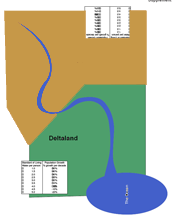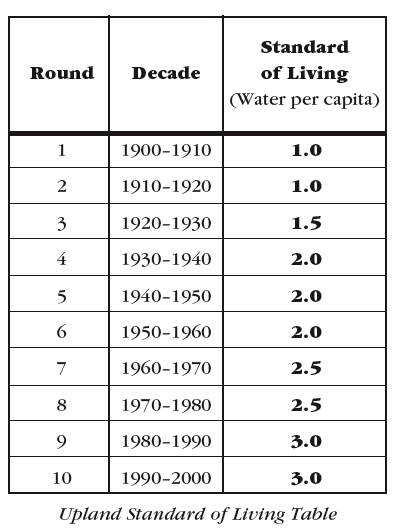Game #1: UPLAND Rule Sheet |
BackgroundTwo countries share a watershed. It is the twentieth century. The main river—the Quint—originates in Upland, where mountains trap rainfall. In 1900, Upland is poor and thinly populated. It is a high country cut off from most commerce, which arrives at the port city by the delta. The country in the river delta region of your river, Deltaland, is richer and more populous, having always profited from commerce. Some rain falls on Deltaland; three times as much falls on Upland. In the game, a roll of dice determines how much rain falls each decade; the amount of water used determines what happens to this rain during the decade. Some water is used and some is passed downstream. The amount of water used depends on population growth, which in turn depends on the standard of living. Your game starts in the year 1900 and goes through ten rounds (or moves), each round representing one decade. The 2 million people in your country are poor but they enjoy its beautiful mountains. These mountains capture* lots of the rain that then fills your valleys and streams with sparkling clear water. You have a larger supply of new fresh water than have the people of Deltaland. (*Consider: Why does it rain more on the mountains than on the lowlands?) |
Getting Started
Appoint a mathematician who determines how many chips to move, an historian who records the history of the country that the game is simulating, and a facilitator who consults the rules and helps the team decide what to do.
You should have some white and some blue counters. The blue counters represent water; each counter stands for a fixed amount of drinkable rain and river water. The white counters represent people; each population counter stands for 1 million people. Start by spreading out the map. |
Play 10 decadesBOTH Upland and Deltaland move, one decade at a time, with Upland moving first in each decade. 1. Make it rain. • Roll the dice to determine the amount of rain that falls on Upland. The amount of rain on Upland is three times the roll or 8, whichever is smaller. • Place this number of white water counters on the part of the Quint River in your country. This represents the water you can use during this decade. 2. Determine your standard of living.
3. Use your water. Withdraw the number of water counters indicated by the Standard of Living Table from the Quint River. This represents the water you use during the decade. Place these counters on top of the population counters. If your calculation results in a half-counter, round up to the nearest even number. 4. Adjust your population. Your Mathematician should consult the Population Growth Table (located on the Simulation Map) to determine how much your population will grow. For instance, if your current standard of living requires two water counters for each population counter, your population will grow by 30% in a decade. If you start the decade with seven counters, you will add 30% or .3°—7 = 2.1 more. Round that to two and add two population counters For example, if the year is 1900, each person (each population counter) “uses” one water counter. Place one water counter on top of each population counter. Since the population is two, then two water counters are used in total. If the year is 1980, Upland is much richer, and you place three water counters on top of each population counter. 5. Send the water downstream. |
| Return to Upstream-Downstream Index |

